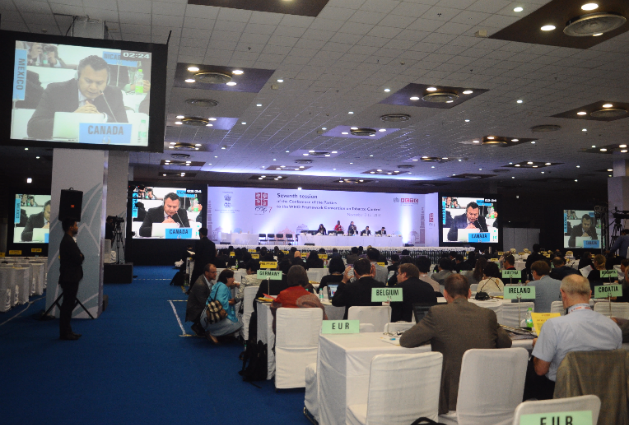 The seventh session of the WHO FCTC Conference of the Parties in New Delhi, November 2016. Image credit: World Health Organization Framework Convention on Tobacco Control Secretariat.
The seventh session of the WHO FCTC Conference of the Parties in New Delhi, November 2016. Image credit: World Health Organization Framework Convention on Tobacco Control Secretariat.
I was extremely surprised to learn that Derek Yach had cited a paper of mine in his recent Lancet piece, Foundation for a smoke-free world, about his new Philip Morris-funded foundation.
I share the positions expressed in the WHO Framework Convention on Tobacco Control Secretariat’s statement on the launch of the Foundation for a Smoke-Free World and the WHO Statement on Philip Morris funded Foundation for a Smoke-Free World. I was mystified that I might have written something that Yach might believe supported his endeavours, particularly as so much of my work is, and has long been, about supporting countries to defend against litigation and legal threats by or funded by Philip Morris and other multinational tobacco companies.
It turned out that Yach had referenced my paper Four COPs and counting: achievements, underachievements and looming challenges in the early life of the WHO FCTC Conference of the Parties, published in early 2012 in the 20th anniversary issue of the journal Tobacco Control. The paper was the sole reference for Yach’s assertion that ‘most development agencies, international research bodies, and regional development banks are stepping back from commitments made during the FCTC negotiations’.
My paper does not support Yach’s assertion. The paper, submitted in September 2011, was a reflection on the early life of the Conference of the Parties (COP) to the WHO Framework Convention on Tobacco Control. In the second paragraph of that paper, I wrote that:
The FCTC, through its terms and the institutions and processes it has generated, has raised the global profile of tobacco control, strengthened governments in their fight against the tobacco industry politically and legally (in the latter case including through the automatic incorporation of the treaty's substantive obligations into law in some countries, expansion of governments' legislative powers and strengthening of governments' hands in legal challenges in domestic and international fora), reinforced the view that tobacco products are not normal consumer products, contributing to the ongoing global denormalisation of the tobacco industry, catalysed the formation and deepening of transnational civil society coalitions, facilitated the sharing of experiences, expertise and capacity among and between governments and non-governmental organisations (NGOs) and brought new resources—political, financial and human—into the field. (emphasis added).
My paper did say that I believed that, as of the 4th session of the COP (ie November 2010), the level of funds committed by WHO FCTC Parties to the work of the COP and the Convention Secretariat, particularly for activities to support implementation in developing countries, had been low compared to need, and that the COP’s budget had not provided sufficient support for the conduct of needs assessments in developing countries. As those who understand the WHO FCTC know well, the COP’s budget, and the activities that that budget supports, including needs assessments, are but one small part of the rich universe of global tobacco control activity, resourcing, and implementation support. I said nothing about development agencies, international research bodies, or regional development banks stepping back from commitments.
In the 6 years since I submitted the paper, and the 7 years since COP-4, the work of the COP has evolved enormously. There have been 3 further COP sessions, at which important decisions have been taken to accelerate implementation and strengthen coordination among the many players now inhabiting the global tobacco control field. While I commented in my paper that only 8 needs assessments had been conducted by the time of COP-4, the Convention Secretariat’s website indicates that at least 42 have now been completed, and notes the support provided by the European Commission and the Australian Government that has enabled them to take place.
And perhaps most importantly, the WHO FCTC has become part of the new Sustainable Development Agenda, generating a host of new activities, commitments, and opportunities. The theme of this year’s World No Tobacco Day was Tobacco – a threat to development.
In my own case, the Centre I lead, the McCabe Centre for Law and Cancer, was established in February 2012. In 2013, we became the WHO FCTC Secretariat’s Knowledge Hub on legal challenges to WHO FCTC implementation. Since then, we have conducted numerous training and capacity-building events at home and around the world as part of our international legal training program. We have run this program with the funding support of a wide range of organisations including governments, international and regional intergovernmental agencies, and non-governmental organisations.
I do not agree with Yach’s assertion and will hope to have his inaccurate reference to my article removed from his Lancet paper.
It may seem that matters such as citations in footnotes are, in the scheme of things, minor. But they touch upon larger questions about the behaviour of those who take the tobacco industry’s money, including when they are afforded the privilege of publishing in reputable scientific journals. In my own area of expertise, I am continually shocked, though no longer surprised, at the way in which tobacco industry funding appears to influence the work of lawyers – both in private practice and academia – as seen all too commonly in the ‘expert evidence’ they provide to courts and tribunals, submissions they make to parliamentary inquiries, and papers they publish.
On re-reading my 2012 article, I was pleased to be reminded that I had ended it thus:
What will have become of the FCTC by the time Tobacco Control turns 40, in 2032? We should hope and work hard for the best, but take nothing for granted. It is hard to think of another treaty that has such a well resourced industry so committed to undermining it.